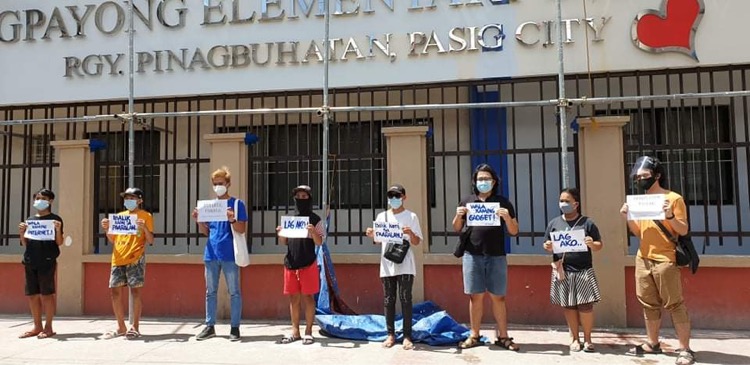On October 5, School Year 2020-2021 formally opened on the same day of World Teachers’ day commemoration. Youth, parents held “First Day Fight” protests throughout the National Capital Region (NCR) decrying unenrollment and distance education woes and urging government to find ways to reopen schools.
Protests were held in Pasig, Manila, Caloocan, Valenzuela, Quezon City, Malabon and in the Department of Education (DepEd) NCR office in Quezon City, where the group Bayan QC also gave teachers roses.

Back to School Network urged the government to not just wait for the vaccine as extended school closures negatively impact students, especially younger ones, citing UK, US doctors and international studies. Many countries in the world have also reopened schools, with the idea of reopening schools with health protocols as the “new normal” in education during the pandemic and while there is no vaccine yet.
Such studies in the Philippines, whether on the effects of extended isolation for students, extended school closures, susceptibility of kids or the youth getting infected or spreading Covid-19 have been sparse. The DepEd has yet to come out with risk analysis for reopening the schools, but was quick to adhere to President Rodrigo Duterte’s declaration for no reopening of classes or schools while there is no vaccine yet, opting for distance learning. Classes in schools have been suspended since March 9, a week before the still ongoing quarantine in the country started.

Instead of distance or flexible learning that have imposed additional expenses to students and their families and where many have complained of heavier work load, the group urged government to reopen schools while pressing for the possibility of alternating classes to allow 30% only of the class size come to school at any given day to ensure physical distancing. Online classes or distance learning should be optional for those who can afford or abide by the requirements of this modality of learning.
Earlier, League of Filipino Students NCR twitted the DepEd report of having 99.68% enrollment in elementary and high schools in the public school system despite this school year experiencing 1.3 million unenrolled or unaccounted from last school year’s enrollment, the lowest number of enrolled students since 2015 (when there was more than 25+ million), and the highest dropout rate in recent history. The group also noted almost 1 million students add to enrollment every year, but even this year’s enrollment of just over 24 million out of last year’s 27 million has shown a drop of 11% in enrollment.

The group also lamented how the government allowed the reopening of Boracay, Baguio and other places for leisure, even for those below 21 or over 60 years old despite a blanket guideline disallowing these age groups from leaving their homes but has not even considered the reopening of schools, as education is a basic right being abandoned by the government in the time of the pandemic.
League of Filipino Students Metro Manila Chairperson Vincent Impas scored how the presidential spokesperson’s office being at Boracay looking like a diversion on a most important day—the reopening of classes in the whole country, that has been twice delayed since June, expecting a lot of problems on the first day as many preparations were still unmet.
In today’s press briefing, Presidential Spokesperson Harry Roque lamented how there are still not many tourists despite the island’s reopening, which Impas said is also due to the government’s Covid-19 efforts not inspiring confidence among the people, while such scare has been literally placed by government in people’s minds when it comes to school opening.

“Immediately allow students to return to school and implement minimum health protocols such as regular mass testing for teaching and non-teaching personnel, ensuring each school has clinics with health workers, ensuring working restrooms and the school has enough water supply, free distribution of masks, alcohol and soap among others. This would also require an education budget different from what the executive is lobbying for in Congress,” Impas said.
Impas added that, like in other countries where schools have reopened, schools and the government must also continue to do Covid-19 screening, testing and tracing. An outbreak may also be inevitable as long as the vaccine is not available, so the government must effectively address the pandemic.

He further mentioned that providing internet load and gadgets would not eradicate difficulties in distance and flexible learning.
“The distance learning of DepEd is ill-planned and executed, it was so expensive but did not even have the budget it needs and also not on time, with modules yet to be delivered to students. Now the DepEd NCR is looking into going fully digital by third grading—a tone deaf proposal amid the high unenrollment, all the complaints of difficulties that students experience.”
Impas said that the more we move away from reopening of schools is the more government is abandoning the youth’s right to education, and leaving only those able to afford and comply with the requirements of the stop gap measures able to continue.





























